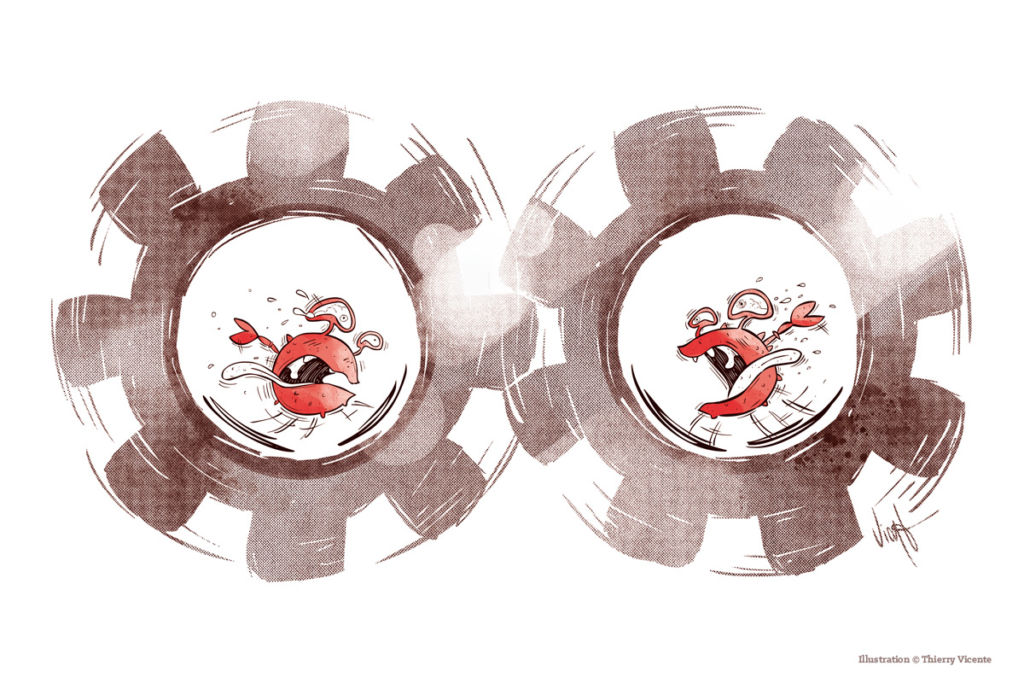[LUM#11] Darwin was right
For 25 years, evolutionary biology has been applying its Darwinian approach to medicine and proposing innovative therapies to combat certain diseases, including cancer. The Center for Ecological and Evolutionary Research on Cancer is a pioneer in this approach based on the principle of natural selection.

"Everything that is alive can be studied through the prism of natural selection, since everything has been influenced by this process since life first appeared on Earth," says Frédéric Thomas, a researcher at the Infectious Diseases and Vectors: Ecology, Genetics, Evolution, and Control (Mivegec) laboratory. And cancer, a living entity within our own bodies, is no exception to this rule theorized by Darwin more than 150 years ago.
For this evolutionary biologist, author of the book The Abominable Secret of Cancer, "it is time to work with doctors to solve, together, the problems of treatment resistance, the leading cause of death among patients." For while chemotherapy is effective when it manages to eradicate all cancer cells without killing the patient, what happens when some of them survive the treatment?
Maintain competition between cells
When chemotherapy-sensitive cells disappear, they leave the field open for resistant cells to develop, causing relapses that can no longer be treated. "If we apply a very aggressive strategy to a tumor, the resistant cells will win twice. First, because they are not killed, and second, because they no longer have any competitors. This is the scenario that must be avoided at all costs," warns Frédéric Thomas.
Faced with this situation, evolutionary medicine advocates so-called adaptive therapies. A light and regular treatment that will kill only a small portion of sensitive cells to prevent the cancer from progressing. "We cut off the branches that stick out, but we maintain competition between sensitive and resistant cells so that the tumor remains stable. " Cancer is treated as a chronic disease, incurable, certainly, but without mortal risk to the patient.
While these treatments appear to be proving effective in the United States, the researcher warns: "These therapies only apply to cancers that have become impossible to eradicate. If a tumor has not started to spread, it must be removed."
Outsmarting cancer
To maintain competition between cells, biologists are also testing the use of fake drugs. Why? If resistant cells survive chemotherapy, it is thanks to small pumps that enable them to expel the poison. This is a huge advantage, but it comes at a price, as these pumps consume a lot of energy. "If we use a fake drug that mimics the effects of the real one, the resistant cells will exhaust themselves activating their pumps for nothing, and you will therefore give the advantage to the sensitive cells, which do not have pumps. " This therapy, used alternately with a real poison, will weaken both resistant and sensitive cells, thereby keeping the tumor in a stable state.
The third therapeutic approach tested by evolutionary biology is known as the "false alarm signal." Cancer cells are genetically very unstable and constantly cause damage to their own DNA, which they must repair. Frédéric Thomas and his colleague atthe Institut Curie, Marie Dutreix, have designed a molecule capable of mimicking a DNA damage signal and flooded the cells with it. The result: completely panicked, the cells attempt to repair their DNA on a massive scale and exhaust themselves without any benefit.
The false alarm
The only way for it to resist is to stop responding to the alert signal. "It's a universal response," explains the researcher. "When the rate of false alarms increases, the threshold above which we respond also increases, even if it means putting ourselves at risk in the event of a real attack. " And that is obviously what the researchers will do after ten weeks, causing real damage that the cells will then be unable to repair.
This highly promising research motivated Frédéric Thomas to found the international Cancer, Ecology, and Evolution Laboratory in 2018, whose partnerships will soon extend from Australia to Florida. "Montpellier is the heart of the volcano, with the largest scientific community in evolutionary biology worldwide. We have the intelligence and motivation, but we lack the means to become the stronghold of evolutionary medicine." A word to the wise...
Contagious cancer
Known to the general public as Taz, the whirling cartoon character, the Tasmanian devil is now an endangered species. The cause? A new and contagious form of cancer that biologist Frédéric Thomas is closely studying: "This cancer appeared 26 years ago and has decimated 90% of the devil population. We are trying to understand how this disease became contagious." Transmitted by bite, it manifests itself in the small marsupial through the appearance of purulent tumors and causes death within six to eight months. "The good news is that we are starting to see resistant devils. The bad news is that a second contagious cancer has appeared," notes the researcher, who will be back in the field in November to observe them.
Find UM podcasts now available on your favorite platform (Spotify, Deezer, Apple Podcasts, Amazon Music, etc.).